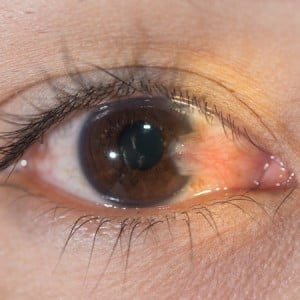A pterygium is a wedge-shaped elevated growth on the cornea (the clear front window of the eye). It is a benign growth that starts on the sclera (the white part of the eye) and extends toward the center of the eye. It is a result of a process in which the conjunctiva grows into the cornea. It contains blood vessels and can form scar tissue that can permanently disfigure the eye.
Causes of Pterygium
Pterygium may be caused by a variety of factors, including environment and genetic predisposition. Long term exposure to UV-light (sunlight) and dry environmental conditions have been linked to their development. Pterygium is sometimes called an eye web or a surfer’s cataract because it can develop as a result of extensive UV exposure that may occur during water sport activities. Exposure to sun, wind, dust, and harsh climates are frequently correlated with pterygia.
Symptoms
- Blurred vision
- Foreign body sensation
- Redness
- Tearing
- Eye irritation
In most cases, a pterygium is mild and may not cause any overt symptoms. Occasionally, a pterygium can become inflamed and irritated. In those cases, patient can develop eye discomfort and light sensitivity. Sometimes, a pterygium can slowly grow and begin to cover the central part of the cornea. As such, a patient can develop vision loss from astigmatism and/or obstruction of the path of light.
Treatment
If the pterygium does not cause any noticeable symptoms, treatment is not necessary. Wearing protective sunglasses with side shields, wide-brimmed hats and using artificial tears may help prevent formation or stop their progression.
While the growth is red and swollen, eye drops and ointments can be used to alleviate dryness and inflammation. In few cases, your ophthalmologist may need to prescribe drops to control the inflammation.
Once the pterygium invades the cornea and begins to threaten vision, it can be removed surgically. Surgery can also be performed for cosmetic reasons.The procedure is safe and effective. It is performed under local anaesthesia and takes about 15-20 minutes. The recovery time is about 1-3 weeks with minimal downtime.

